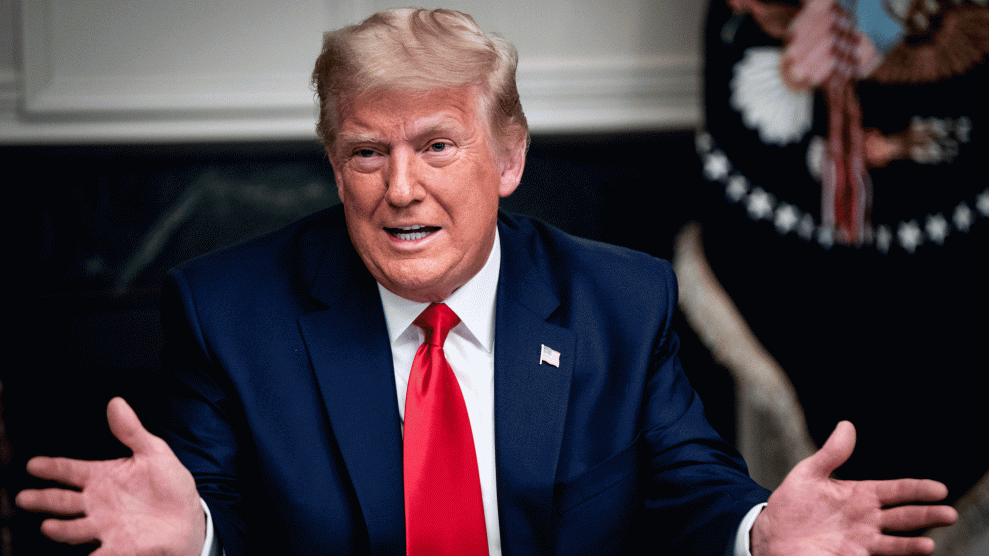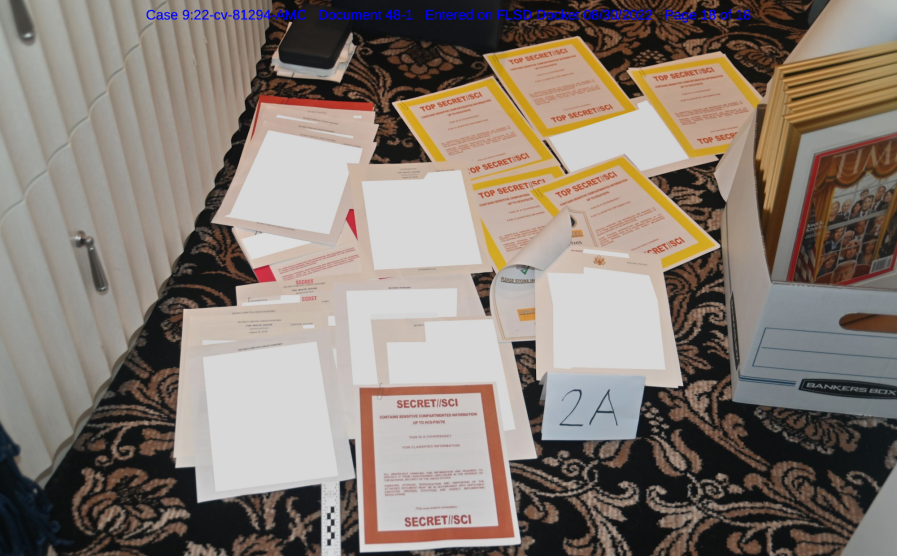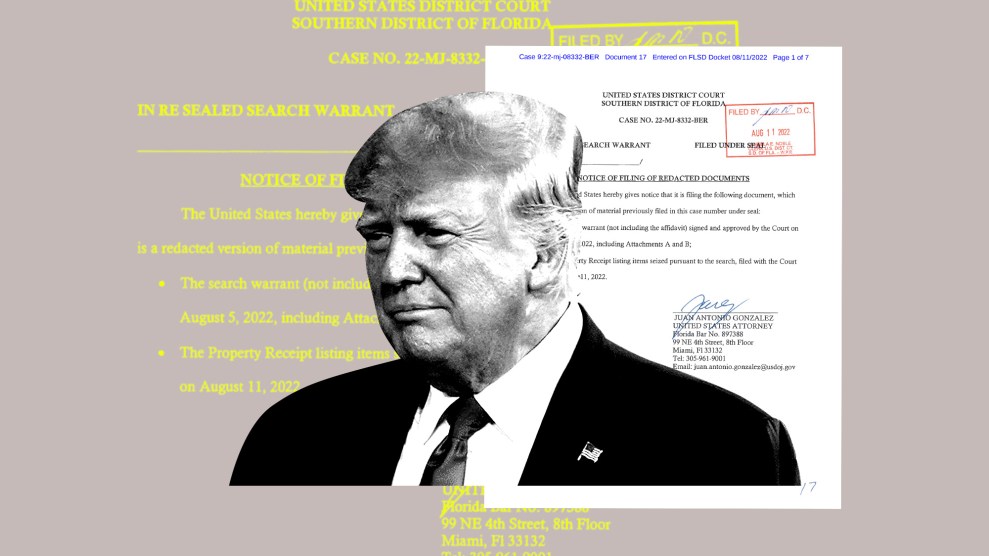
Erin Schaff/ZUMA
We know what Donald Trump did: He absconded from the White House with classified and top secret documents that belonged to the US government; he mishandled these highly sensitive records in his Mar-a-Largo lair (see this photo); he resisted the efforts of the government to retrieve these records; he employed a legal team that falsely certified that all classified material had been returned; and his actions prompted the Justice Department to investigate whether he and his crew obstructed justice or violated other federal laws, including the Espionage Act.
The big question is why. Why did FPOTUS, as he has been dubbed in Justice of Department court filings, run off with the most classified of documents, including records based on confidential human sources? It seems clear that this was no accident. Had it been inadvertent, Trump and his aides would have quickly responded to requests from the National Archives to return the goods, and they would have sent back all the requested material, not merely a portion. And if they had errantly not returned the full complement of super-secret papers, they presumably would have snapped-to and FedExed the rest back once informed by the Archives and the FBI that the former guy still improperly possessed hush-hush documents from his reign.
Though one can never discount incompetence in the course of such matters, the known evidence suggests Trump really, really wanted to keep these papers. In its legal filings following the FBI raid on Trump’s club, though, the Justice Department has not presented its view of Trump’s motives. But that hasn’t stopped a frenzy of speculation on the internet. Nor should it. Given that Trump ran for president in 2016 charging that Hillary Clinton had harmed national security by using a personal server for her email when she was secretary of state and vowing that he would “enforce all laws concerning the protection of classified information,” this scandal is yet the latest sign of the brazen hypocrisy and blatant corruption at the root of his MAGA demagoguery and its embrace by the Republican Party. This affair warrants full examination, and that includes the reasons for Trump’s apparent flouting of the law. So let’s look at a few possible explanations.
The Double-Agent Theory. The most outlandish notion is that Trump hung on to these papers because he wanted to sell or give these secrets to another government. The Russians? The Saudis? He’s either an operative in cahoots with a foreign power or an operator who wants to cash in. Though Trump has a record of slipping classified information to Moscow, it’s difficult to imagine him plotting to sell secrets. That would entail a fair bit of organizing and hard work. It’s not easy being a spy. And there are less troubling ways for FPOTUS to make a bundle these days. Trump has been pocketing money from the Saudis for hosting golf tournaments. (Jared Kushner’s private equity fund banked a whopping $2 billion from a fund controlled by Mohammad bin Salman, the murderous Saudi leader). Trump may want to share top US government secrets with certain overseas governments because he feels an affinity for them or their leaders. (See Vladimir Putin.) But assuming he read these documents—or was briefed on them and paid attention—he could pass along the information without having to possess the records themselves.
They’re Mine! Throughout his presidency, Trump demonstrated that he’s a big believer in that old French saying, l’etat est moi. He was not the custodian of the US government and the servant of the national interest; he was the government and his interests were the government’s interests. In this warped view, all these records belong to him and exist for his benefit. He has exclusivity and can control how they are used. Maybe he believes some of these records could help him prove one of the scads of untrue conspiracy theories he has promoted over the years. Perhaps he wants to use them for a memoir. Or to show them off to his pals in the Mar-a-Lago buffet line? Or one day place them in an exhibit in his presidential museum? (Will he charge his MAGA followers an entrance fee?) Why should anyone else possess his love letters with North Korean dictator Kim Jong-un? Spite is a large part of Trump’s psychological algorithm. It’s not a stretch to envision Trump, scorned by the voters and fired from the presidency, defiantly hanging on to documents he was not allowed to keep and shooting the bird at the (Deep State!) bureaucrats and intelligence community he despised. Mine, mine, mine.
Gimme Ammo. Did Trump have a use in mind for these documents when he grabbed them on his way out of the White House? Could this material somehow be leveraged or weaponized? Did it contain ammunition to be deployed against his political enemies? How often does Trump ask himself, “What would Roy Cohn do?” Cohn, once Trump’s lawyer, was a notorious fixer and alleged extorter and blackmailer. The legend is that he squirreled away dirt—including sexual material—on present and potential foes. If there was anything in these boxes that Trump could one day exploit to undercut or destroy an opponent, he would likely have a tough time parting with it. According to a Justice Department filing, material seized by the FBI during its raid of Trump’s club included “info” on French President Emmanuel Macron. Hmmmm. Rolling Stone has reported that Trump for years bragged he had scandalous information on Macron’s sex life that had been obtained through intelligence collection. Something juicy on the French president? Of course, Trump would want to hold on to that. Who knows when it might come in handy? Or it might only be a party favor he could flash to impress his pals at Mar-a-Lago. Trump harbors a deep resentment of the US intelligence community—to such an extent he might want to do it harm. Were there secrets in these boxes that he could use or reveal to achieve that aim? As I’ve written several times, one of Trump’s great motivators is revenge—which is a cousin of spite. He is obsessed with revenge and has acknowledged it as a driving force for many of his decisions. As he told an audience in 2011, “One of the things you should do in terms of success: If somebody hits you, you’ve got to hit ’em back five times harder than they ever thought possible. You’ve got to get even.” Undoubtedly, Trump left the White House with a tremendous thirst for revenge. These documents could possibly help him seek vengeance.
We Can’t Let Anyone Know This! The public court filings in this case do not indicate if these documents are a hodgepodge of records or focus on particular issues. But one possibility is that Trump did not pilfer them to exploit them but that he purloined them because he didn’t want anyone else to see them. Might they chronicle decisions or episodes that occurred during his presidency that he wishes remain unexposed? It’s possible that copies of this material may be retained in government files. Still, Trump might have swiped records that he believed would be embarrassing or dangerous for him. (Imagine a transcript of one of his private talks with Putin.) Of course, if these documents fell into that category, Trump would likely protect them better than these boxes generally were. But care and competence are not always present within Trumpworld. If this collection of filched papers contained secrets that Trump must hide for his own protection, he would certainly not think twice about breaking the law to do so.
The Justice Department filings suggest Trump’s actions were intentional. He nicked these records and held on to them—in the face of pleas from the government for their return—for a reason. In most criminal investigations, motivation is a key element. The FBI determined that Hillary Clinton’s handling of records, which included classified material, was careless and violated the rules but that she did not intend to circumvent the law. If the Justice Department does pursue an indictment against Trump or his minions, it will have to address the issue of motive. Should that occur, Trump will not be able to plead ignorance. His statements from the 2016 campaign demonstrate he was well aware of the possible criminality of mishandling classified information. And there’s nothing surprising about how he has disregarded the law in this episode. What needs to be revealed is why Trump acted so recklessly. Considering how ineptly Trump’s legal response has been so far and how strong the Justice Department case appears at this point, Trump’s motive might eventually get its day in court.













